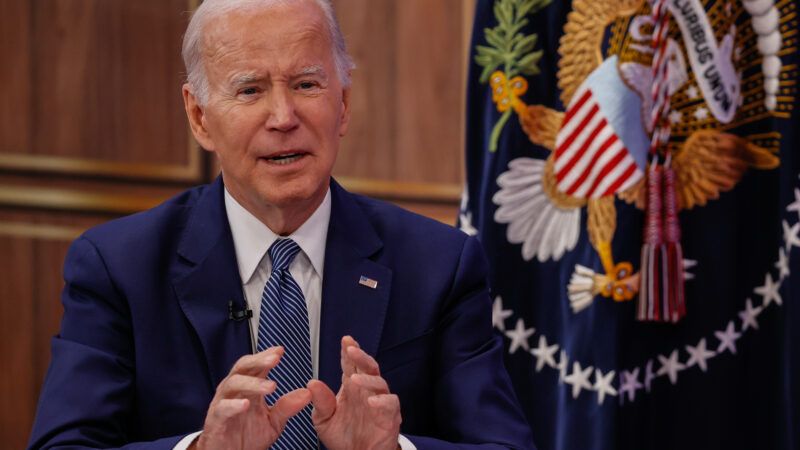Biden Chips Away at Trump's Deregulatory Legacy With New Gig Worker Rule
The administration's draft regulations expand and complicate who the federal government considers an "employee."

The Biden administration took yet another swipe at former President Donald Trump's deregulatory legacy today with the release of a draft regulation that would expand (and complicate) the federal definition of who counts as an employee vs. an independent contractor.
It's the latest spat in the war being waged in states across the country (most notably/notoriously California) over how to classify Uber drivers, tattoo artists, and opera singers as gig economy arrangements have grown in relation to traditional employment.
Organized labor and liberal lawmakers have tried to lump as many workers into the "employee" bucket as possible in an effort to guarantee more people the overtime pay and benefits that come with that designation. But those efforts have often provoked rebellions from gig workers themselves (and the companies they do business with) who object to the added regulation and rigidity that comes with being an employee.
The draft regulation released by the U.S. Department of Labor (DOL) today sides with the former group. They propose reinstating a pre-existing, six-factor "totality-of-the-circumstances" test for determining who counts as an employee under the Fair Labor Standards Act (FLSA).
That test more closely aligns with the expansive definition of an employee put forth by bills like California's A.B. 5 or the federal PRO Act.
"While independent contractors have an important role in our economy, we have seen in many cases that employers misclassify their employees as independent contractors, particularly among our nation's most vulnerable workers," said Secretary of Labor Marty Walsh.
The DOL's proposal would replace a narrower test issued during the last days of the Trump administration that determined a worker's employment or contractor status by how much control the worker exercised over his time and his "opportunity for profit or loss."
In a complicated legal-regulatory back-and-forth, the Biden administration's efforts to delay that rule were shot down by the courts. The DOL's regulatory filing today moves to fully rescind and replace that rule.
The new proposed rule is provoking criticism from business interests who argue the narrower Trump administration rule is a better fit for the modern economy.
"The current rules clearly define the difference between employees and independent contractors, providing much-needed legal certainty for employers, employees and independent contractors alike," said David French (not that one) of the National Retail Federation. "The changes being proposed by the Labor Department will significantly increase costs for businesses across all industries, and further drive already rampant inflation."
Contractor associations have objected too.
"[We're] deeply disappointed that the Biden DOL is moving forward with a proposed rule that will disrupt legitimate independent contractors, which are an essential component of the construction industry," said Ben Brubeck of the Associated Builders and Contractors, a co-plaintiff in the successful lawsuit that stopped the Biden administration revoking the Trump administration regulations. "Rescinding the commonsense 2021 final rule will increase the confusion and litigation chaos."
Sean Higgins, a labor policy researcher at the free market Competitive Enterprise Institute, says that litigation chaos is unlikely given that the DOL is reinstating federal standards that had been on the books for decades. But the Biden administration's new standard reduces certainty for businesses and workers about when an employer-employee relationship exists.
The Trump rule "boiled it down to a fairly simple question of just who is in charge around here. That determined whether a worker was a freelancer or not. It put the power in the hands of the workers themselves," Higgins tells Reason. Returning to the old six-factor test "makes everything more confusing."
The primary impact of DOL's rule-making, says Higgins, will be to make it easier to have states pursue A.B. 5–type bills and regulations by reimposing that more expansive federal definition of employee.
The proposed DOL rule will be published in the Federal Register later this week. The public will have until November 28 to submit comments on it.

Show Comments (94)